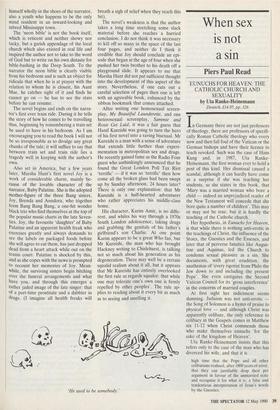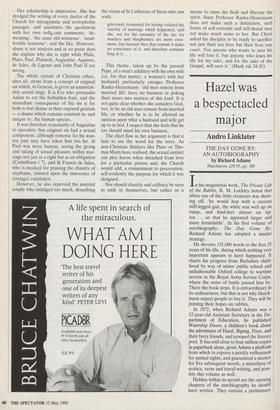When sex is not a sin
Piers Paul Read
EUNUCHS FOR HEAVEN: THE CATHOLIC CHURCH AND SEXUALITY by Uta Ranke-Heinemann
Deutsch, f14.95, pp. 326
In Germany there are not just professors of theology, there are professors of specifi- cally Roman Catholic theology who every now and then fall foul of the Vatican or the German bishops and have their licence to teach revoked. Such was the case of Hans Kung and, in 1987, Uta Ranke- Heinemann, the first woman ever to hold a post of this kind. Her dismissal caused a scandal, although it can hardly have come as a surprise if she was teaching her students, as she states in this book, that `Mary was a married woman who bore a child — indeed an unprejudiced reader of the New Testament will concede that she bore quite a number of children'. This may or may not be true, but it is hardly the teaching of the Catholic church.
Her hypothesis, in Eunuchs for Heaven, is that while there is nothing anti-erotic in the teachings of Christ, the influence of the Stoics, the Gnostics and the Essenes, and later that of perverse fanatics like Augus- tine and Aquinas, led the Church to condemn sexual pleasure as a sin. She documents, with great erudition, the anathemas of 'every rigorist from Philo the Jew down to and including the present Pope'. She even castigates the Second Vatican Council for its 'gross interference' in the concerns of married couples.
At first sight her indictment seems damning. Judaism was not anti-erotic the Song of Solomon is a hymn of praise to physical love — and although Christ was apparently celibate, the only reference to celibacy in the Gospels comes in Matthew xix 11-12 when Christ commends those who make themselves eunuchs 'for the sake of the kingdom of Heaven'.
Uta Ranke-Heinemann insists that this refers only to the case of the man who has divorced his wife, and that it is
high time that the Pope and all other celibarians realised, after 1800 years of error, that they can justifiably drop their pet argument in favour of the unmarried state and recognise it for what it is, a false and tendentious interpretation of Jesus's words by the Gnostics.
Her scholarship is impressive. She has dredged the writing of every doctor of the Church for misogynistic and erotophobic passages, and annotates the quotations with her own indigdant comments: 'de- meaning', 'the same old nonsense', 'insuf- ferable nonsense', and the like. However, abuse is not analysis and at no point does she explain why she is right while Philo, Plato, Paul, Plutarch, Augustine, Aquinas, de Sales, de Ligouri and John Paul II are wrong.
The whole system of Christian ethics, after all, stems from a concept of original sin which, in Genesis, is given an unmistak- ably sexual tinge. It is Eve who persuades Adam to eat the forbidden fruit, and the immediate consequence of the sin is for both to feel shame at their exposed genitals — a shame which remains constant in, and unique to, the human species.
It was therefore reasonable of Augustine to speculate that original sin had a sexual component, although remorse for his wan- ton past may have taken him too far. St Paul was more human, seeing the giving and taking of sexual pleasure within mar- riage not just as a right but as an obligation (Corinthians i 7), and St Francis de Sales, who is mocked for praising the chastity of elephants, insisted upon the innocence of conjugal copulation.
However, he also reproved the married couple who indulged too much, describing the vision of St Catherine of Siena who saw souls grievously tormented for having violated the sanctity of marriage which happened, said she, not for the enormity of the sin, for murders and blasphemies are more enor- mous, but because they that commit it make no conscience of it, and therefore continue long in it . . .
This theme, taken up by the present Pope, of a man's adultery with his own wife (or, for that matter, a woman's with her husband) particularly enrages Professor Ranke-Heinemann: 'old men remote from married life' have no business in poking their noses into matters of this kind. It is not quite clear whether she considers God, too, to be an old man remote from married life, or whether he is to be allowed an opinion upon what a husband and wife get up to in bed. I suspect that she feels that he too should mind his own business.
The chief flaw in her argument is that it fails to see the wood for the trees. As non-Christian thinkers like Plato or Tho- mas Mann have realised, the sexual instinct can play havoc when detached from love for a particular person and, the Church would add, a commitment to procreation, self-evidently the purpose for which it was designed.
Nor should chastity and celibacy be seen as ends in themselves, but rather as a means to tame the flesh and liberate the spirit. Since Professor Ranke-Heinemann does not make such a distinction, such forms of self-restraint and self-denial may not make much sense to her. But Christ asked his disciples to be ready to sacrifice not just their sex lives but their lives tout court. Tor anyone who wants to save his life will lose it; but anyone who loses his life for my sake, and for the sake of the Gospel, will save it.' (Mark viii 34-35)





























































 Previous page
Previous page